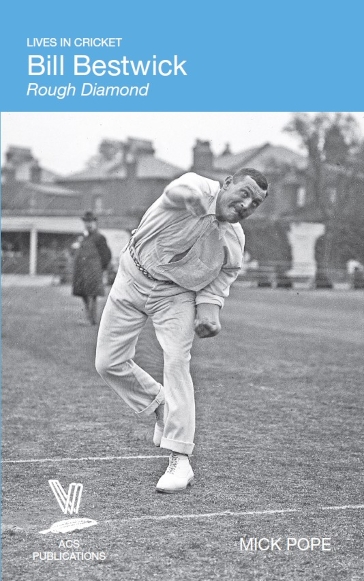To be fair to the great post-war duo, they were able to help each other and, in Derek Morgan and Edwin Smith had fine bowlers to help dismantle the opposition batting. With the exception of a few years when he bowled opposite Arnold Warren, Bestwick WAS the Derbyshire attack. He bowled unchanged for hour after hour, keeping up a remarkable hostility when ordinary men would have tired.
He was used to hard work down the pit, of course, where he returned each winter. The hard work forged broad shoulders, great strength, strong legs and a willingness to bowl, which he generally did without complaint from April to September.
For a captain he was a dream, though he didn't always turn up and sometimes, when he did, alcohol had done him no favours. Because Bill liked a drink, undoubtedly a little too much, and it was his achilles heel. As Arnold Warren's one impressive Test appearance was never repeated after over-zealous celebration, so Bill's chances of Test selection when the country had few better bowlers were wrecked by being simply too unreliable around alcohol.
Mick Pope's outstanding book is a 'warts and all' look at a player who appeared too often in front of the magistrates and in newspapers for the wrong reasons. Plenty would tell you he was a lovely, generous man much of the time, but he was an aggressive drunk who could be his own worst enemy. As long-time club secretary, Will Taylor put it 'he was a very pleasant individual but gave us, through his thirst, some very difficult moments.'
It is all in here. The rise to county stardom from nowhere, the loss of his wife, then the fight (one of many) that led to a charge of manslaughter. His sackings by Derbyshire and a Lancashire League club, a move to Wales and then his re-emergence in one of the county's darkest hours to take 147 wickets in 1921 at the age of 46. Forty-six..
He bowled over 900 overs that summer, at an age when most are long - retired. Those who saw him in action are long gone, but a short run up and those strong shoulders saw him surprisingly quick with a devastating break back and one that cut away sharply. He was a very ordinary fielder and no batsman has recorded more ducks for the county, but Bill Bestwick could certainly bowl.
It is far from a conventional cricket biography, but then Bill Bestwick was far from a conventional man, one who polarised opinion and yet was a key member of his county side for almost a quarter century.
He was one of three Derbyshire players not yet fully documented in print whose life and career was always worthy of exploration. I had considered doing it, but I don't think anyone could have brought him to life as well, or as thoroughly, as Mick Pope has here.
He isn't a Derbyshire man, as he notes in the book, but that doesn't matter. He considered dropping the project after the direct family line descendants didn't want to be involved, but for cricket history and literature it is a good job that he didn't.
I have read hundreds, maybe thousands of cricket books, but not many of them twice. I can pay no greater tribute to the author than that I will be starting this again, soon.
It is that good. If you are a fan of cricket, social history, a character who is both hero and villain and a lover of a damn good read, this is the book for you.
Well done Mick. You played a blinder.
Bill Bestwick: Rough Diamond is written by Mick Pope and published by ACS Publications as part of their Lives in Cricket series.
It is priced £16 and can be ordered herelink

No comments:
Post a Comment
Please remember to add your name. Avoid personal comment at all times. Thanks!